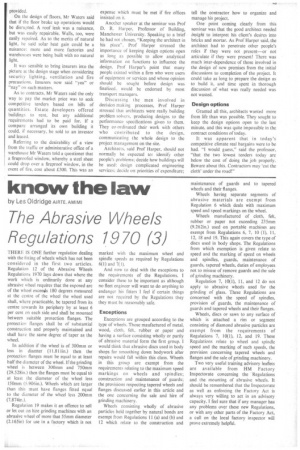know the law
Page 51

If you've noticed an error in this article please click here to report it so we can fix it.
by Les Oldridge AIRTE, AMIMI
The Abrasive Wheels Regulations 1970 (3)
THERE IS ONE further regulation dealing with the fitting of wheels which has not been considered in the first two articles. Regulation 12 of the Abrasive Wheels Regulations 1970 lays down that where the work which is ordinarily done at any abrasive wheel requires that the exposed arc of the wheel exceeds 180 degrees measured at the centre of the wheel the wheel used shall, where practicable, be tapered from its centre towards its periphery by at least 6 per cent on each side and shall be mounted between suitable protection flanges. The protection flanges shall be of substantial construction and properly maintained and shall have the same degree of taper as the wheel.
In addition if the wheel is of 300mm or less in diamter (11.811in.) then the protection flanges must be equal to at least half the diameter of the wheel. If the grinding wheel is between 300mm and 750mm (29.528in.) then the flanges must be equal to at least the diameter of the wheel less 150mm (5.906in.). Wheels which are larger than this must have flanges fitted equal to the diameter of the wheel less 200mm (7.874in.).
Regulation 19 makes it an offence to sell or let out on hire grinding machines with an abrasive wheel of more that 55mm diameter (2.165in) for use in a factory which is not
marked with the maximum wheel and spindle speeds as required by Regulations 6(1) and 7(1).
And now to deal with the exceptions to the requirements of the Regulations. I consider these to be important as although no fleet engineer will want to do anything to endanger his fitters I feel if certain things are not required by the Regulations they they must he reasonably safe.
Exceptions
Exceptions are grouped according to the type of wheels. Those maufactured of metal, wood, cloth, felt, rubber or paper and having a surface consisting wholly or partly of abrasive material form the first group. I would think that abrasive discs used in body shops for smoothing down bodywork after repairs would fall within this class. Wheels in this group are exempt from the requirements relating to the maximum speed markings on wheels and spindles; construction and maintenance of guards; the provisions respecting tapered wheels and flanges discussed earlier in this article and the one concerning the sale and hire of grinding machinery.
Wheels consisting wholly of abrasive particles held together by natural bonds are exempt from Regulations I 1 (a) and (b) and 12 which relate to the construction and
maintenance of guards and to tapered wheels and their flanges.
Wheels having separate segments of abrasive materials are exempt from Regulation 6 which deals with maximum speed and speed markings on the wheel.
Wheels manufactured of cloth, felt, rubber or paper not exceeding 235mm (9.262in.) used on portable machines are exempt from Regulations 6, 7, 10 (1), 11, 12, 18 and 19. This again covers the type of discs used in body shops. The Regulations from which exemption is given relate to speed and the marking of speed on wheels and spindles, guards, maintenance of guards, tapered wheels, duties of employees not to misuse of remove guards and the sale of grinding machinery.
Regulation 7, 10(1), 11, and 12 do not apply to abrasive wheels used for the grinding of glass. These Regulations are concerned with the speed of spindles, provision of guards, the maintenance of guards and tapered wheels and their flanges.
Wheels, discs or saws to any surface of which is attached a rim or segment consisting of diamond abrasive particles are exempt from the requirements of Regulations 7, 10(1), 12, and 19. These Regulations relate to wheel and spindle speed and the marking of such speeds, the provision concerning tapered wheels and flanges and the sale of grinding machinery.
Two very useful training advisory leaflets are available from HM Factory Inspectorate concerning the 'Regulations and the mounting of abrasive wheels. It should be remembered that the Inspectorate as well as enforcing the Factory Act is always very willing to act in an advisory capacity. I feel sure that if any manager has any problems over these new Regulations, or with any other parts of the Factory Act, a call on the local factory inspector will prove extremely helpful.




























































































